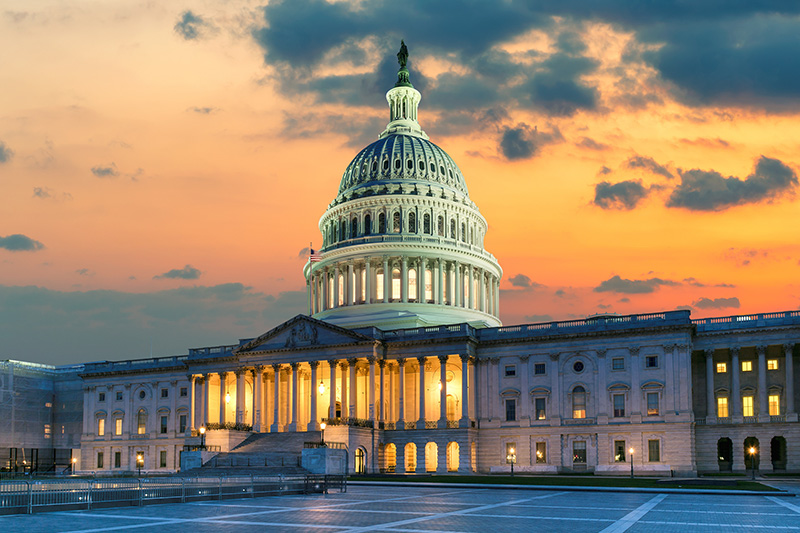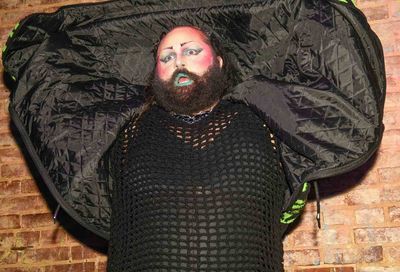Justice Department files statements of interest in two transgender cases
Both statements explain why the Biden administration believes state laws in West Virginia and Arkansas are unconstitutional.

The U.S. Department of Justice has filed statements of interest in two cases stemming from lawsuits challenging recent laws restricting transgender rights.
The first case in which the DOJ has filed a statement of interest is B.P.J. v. West Virginia State Board of Ed., in which an 11-year-old transgender girl is challenging a recently passed law that would prohibit her from joining her middle school girls’ cross-country team.
Instead, under the law, because she was assigned male at birth, she can only join the boys’ team. Her lawyers argue that the law discriminates against her, and other trans youth, based on their sex and gender identity, making it unconstitutional under both the Equal Protection Clause and Title IX, the federal law prohibiting sex-based discrimination.
The second case is Brandt v. Rutledge, a challenge to a recently passed Arkansas law that bars transgender youth from accessing gender-affirming treatments.
In that case, four transgender youths and their parents are seeking to block the state from enforcing the law in the hope of ultimately overturning it. In their lawsuit, they argue the ban on care is unconstitutional because it violates the Equal Protection Clause, in addition to infringing on parental rights and the free speech rights of both trans youth and the physicians they seek out for medical advice and care.
Typically, a statement of interest by the DOJ is issued when a presidential administration believes that a particular law or interpretation of a statute is essential to understanding how that law should be enforced.
While the department taking a particular position does not necessarily guarantee that courts will adopt a similar view of a law or legal issue, explaining the law’s importance in the context of individual or civil rights can provide context about why something is important.
So, for instance, in the West Virginia case, DOJ’s embrace of the concept that anti-transgender discrimination is a form of impermissible sex discrimination is crucial to understanding why the DOJ believes the state law is unconstitutional.
In the West Virginia case, the DOJ notes that “[t]he United States has a significant interest in ensuring that all students, including students who are transgender, can participate in an educational environment free of unlawful discrimination and that the proper legal standards are applied to claims under Title IX and the Equal Protection Clause.”
Earlier this year, President Joe Biden issued an executive order protecting LGBTQ people from discrimination based on their sexual orientation or gender identity, and another order directing the Department of Education to reassess its nondiscrimination policy.
Earlier this week, the Department of Education issued a notice of interpretation stating that Title IX’s prohibitions on sex-based discrimination also protect transgender youth and LGB-identifying youth. The department’s embrace of that interpretation is clearly communicated in its statement of interest in the B.P.J. case.
“The State claims that H.B. 3293 [the ban on transgender athletes in women’s sports] will protect athletic opportunities for girls. Neither the facts nor the law supports that assertion,” the DOJ writes in its statement.
“To be sure, there remain significant barriers to providing full equity in athletics for female students. But permitting participation by transgender girls, who make up ‘approximately one half of one percent’ of the United States’ population, is not one of them.”
The statement of interest goes on to say that a state law that “limits or denies a particular class of people’s ability to participate in public, federally funded educational programs and activities solely because their gender identity does not match their sex assigned at birth violates both Title IX and the Equal Protection Clause.”
See also: West Virginia governor signs transgender athlete ban into law
The Justice Department also notes that the law is extremely difficult to enforce, and will likely end up sidelining more cisgender girls when they are flagged by school or athletic officials for scrutiny due to alleged gender-nonconformity.
“Though the law purports to bar only transgender girls from joining the girls’ team, the practical effect is that every girl in West Virginia may be subject to having her eligibility for a single-sex team challenged merely because some other student claims the girl in question is not a ‘real’ girl. This is likely to affect girls who do not adhere to sex stereotypes and who present as less stereotypically feminine,” the DOJ writes.
“While intended to expose transgender girls, the consequences would be harmful for gender non-conforming cisgender girls as well. Indeed, two doctors testified that being the subject of such a challenge would be ‘psychologically devastating,’ ’embarrassing, humiliating,’ ‘lead to the…person being ostracized,’ and increase her suicide risk. Thus, rather than protecting opportunities for girls, the law could reasonably chill athletic participation by all girls who do not conform to sex stereotypes.”
Avatara Smith-Carrington, an attorney and a Tyrone Garner Memorial Law Fellow with Lambda Legal, told Metro Weekly in an interview that the statement of interest in the B.P.J. case basically clarifies the scope of Title IX as interpreted by the Justice Department, which has the potential influence how courts rule on such matters.
“Title IX provides that no person in the United States shall, on the basis of sex, be excluded from participation in, or denied the benefits of, or subjected to discrimination under any education program or activity receiving federal financial assistance,” Smith-Carrington said. “That means that a person on the basis of sex can’t be excluded from participation, especially if this program or activity is receiving federal financial assistance. So that can include interscholastic, intercollegiate clubs or intramural athletics.”

In the Arkansas case, the DOJ has argued that the United States has a “strong interest” in protecting the rights of LGBTQ individuals, noting Biden’s LGBTQ nondiscrimination executive order.
With respect to the law banning access transgender health care, the DOJ argues that the Arkansas law not only denies people access to health care solely on the basis of their sex. The law also makes physicians and health care professionals legally liable for professional misconduct if they provide gender-affirming care or refer a minor to another professional who provides such care.
“Focusing on surgical treatments for minors like ‘genital or nongenital gender reassignment surgery’ that are prohibited by Act 626 is a red herring,” the DOJ writes in its statement of interest. “In reality, those treatments are very rarely prescribed for transgender minors. In fact, treatment guidelines for children and adolescents require a methodical, step-by-step treatment regimen that infrequently leads to surgery for minors.”
Unfortunately, the DOJ argues, the law inserts the state into the personal medical decisions and violates the doctor-patient relationship, offering its own prescription for people suffering from gender dysphoria — namely, that they just deal with it and suffer in silence — rather than relying on the judgment of medical professionals.
Additionally, because the law does single out transgender minors for disparate treatment based on their assigned sex at birth, the DOJ concludes, it violates the Equal Protection Clause.
“[The ban on trans health care] cannot survive heightened scrutiny because the State’s articulated objectives are merely pretextual justifications lacking any scientific or factual basis. The law, which prohibits widely-accepted treatment protocols, would deny transgender minors medically necessary care solely based on their sex assigned at birth and their transgender status,” the DOJ writes. “If the State truly intended to protect ‘vulnerable’ minors, it would not insert itself into the physician-patient relationship for purposes of depriving these minors’ necessary and appropriate treatment.”
See also: Arkansas lawmakers allow Attorney General to sue schools with trans athletes
The Human Rights Campaign issued a statement praising the DOJ’s actions in both the West Virginia and Arkansas cases.
“The Biden administration’s Department of Justice took an important step to protect transgender young people from egregious laws passed by state legislatures to discriminate against transgender youth. With these actions, this Justice Department is making clear that these laws are harmful and illegal and cannot be tolerated,” Alphonso David, the president of HRC, said in a statement.
“Time after time this legislative session, state lawmakers have passed discriminatory laws that strip transgender young people of fundamental rights, dignity, and the opportunity to thrive. They have done so despite failing to cite any evidence that their legislation is solving an existing problem. That’s because it is simply motivated by bias and has no basis in fact,” added David. “Instead, this record-setting legislative push is being advanced by anti-equality extremists and legislators looking to score political talking points on the backs of transgender young people. … We are pleased that the Biden Administration’s Justice Department is joining this fight to protect transgender young people and create consequences for states that attempt to write discrimination into law.”
See also:
Danica Roem used a troll’s anti-trans message to raise thousands for her campaign
Caitlyn Jenner claims it’s easier to come out as trans than as a Republican
Supreme Court sides with Catholic adoption agency refusing to place children with same-sex couples
Support Metro Weekly’s Journalism
These are challenging times for news organizations. And yet it’s crucial we stay active and provide vital resources and information to both our local readers and the world. So won’t you please take a moment and consider supporting Metro Weekly with a membership? For as little as $5 a month, you can help ensure Metro Weekly magazine and MetroWeekly.com remain free, viable resources as we provide the best, most diverse, culturally-resonant LGBTQ coverage in both the D.C. region and around the world. Memberships come with exclusive perks and discounts, your own personal digital delivery of each week’s magazine (and an archive), access to our Member's Lounge when it launches this fall, and exclusive members-only items like Metro Weekly Membership Mugs and Tote Bags! Check out all our membership levels here and please join us today!






























You must be logged in to post a comment.